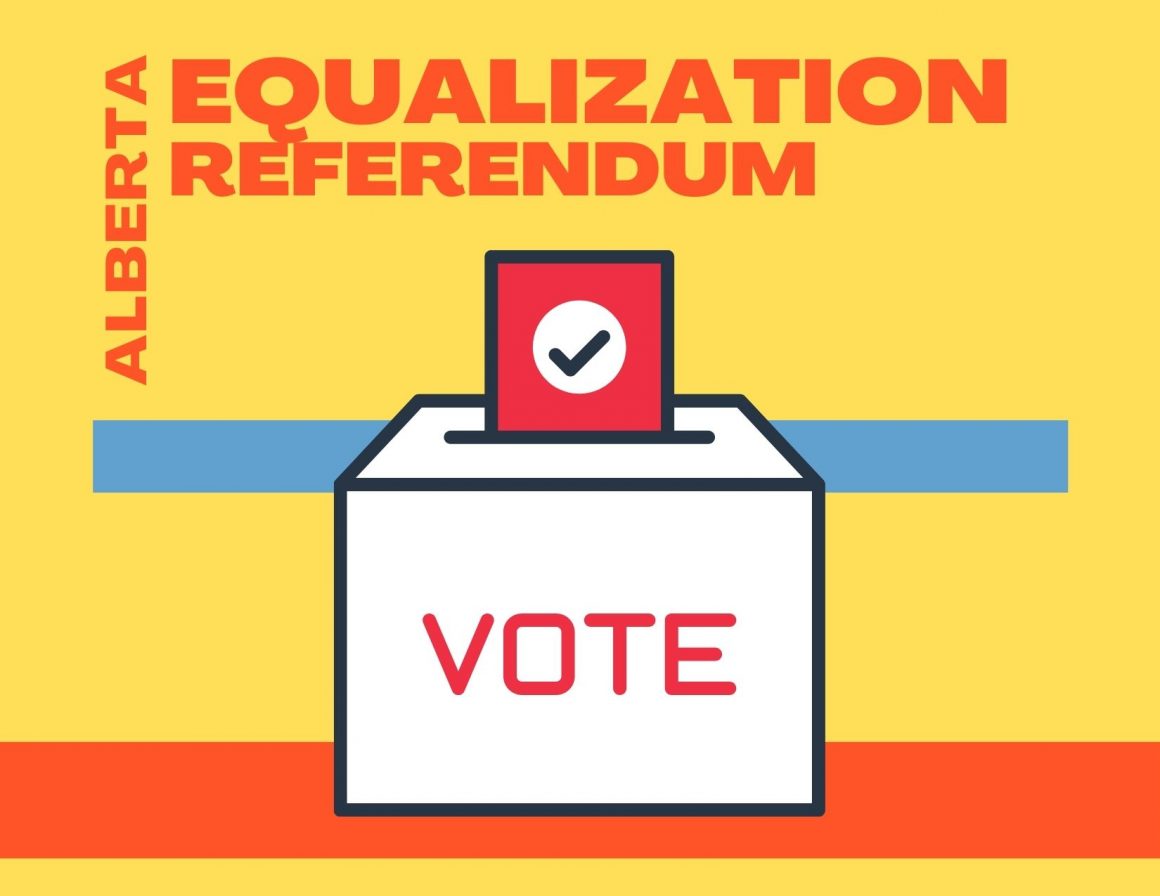
The provincial government is having it both ways on their equalization referendum
By Logan Jaspers, November 8 2021—
The results from the municipal election on Oct. 18 with the most material bearing on our lives, are those from City Hall. But for my fellow politicos, the most interesting set of results are those from Alberta’s equalization referendum. The referendum passed with 642,501 Albertans voting in favour compared to 399,169 Albertans against — a majority of about 62 per cent. Following the referendum’s electoral passage comes… nothing. Alberta, nor any other province, can just unilaterally change the constitution.
Of course, the premier understands this, right? He does, but he’s parading the results around anyways. Jason Kenney called the results “a powerful statement” from the Oct. 26 presser announcing the official tallies from Oct. 18. Momentarily set aside what it’s a powerful statement against — let’s first instead consider how it’s a powerful statement.
Turnout across the province for Oct. 18’s elections was just 38.7 per cent, or just over a million Albertans. Calgary beat the provincial average with a turnout of 46.4 per cent — still a low figure. With a referendum question like “Should Section 36(2) of the Constitution Act, 1982 — Parliament and the Government of Canada’s commitment to the principle of making equalization payments — be removed from the Constitution?” low turnout means no mandate. With just over 640,000 Albertans voting for the referendum, Kenney’s “mandate” is the support of less than 15 per cent of the province’s total population. Hardly the democratic backing Kenney is making it out to be.
Equalization isn’t just a part of the constitution. Through this referendum, the provincial government put a part of federalism as a form of government up to a popular vote with virtually no public campaigning. When putting a very principle of Canada up to a vote, the public should be expected to participate and to know what they’re voting on. The provincial government did nothing to foster either attitude.
To provide contrast, Quebec’s 1995 sovereignty referendum had a turnout of over 93 per cent. Admittedly, the sovereignty referendum is far from a perfect comparison — Quebec’s government understood the results to be binding, for a start. But it had such a high turnout because there was a proper campaign for it. Politicians and activists alike wanted and got mass public engagement.
In Alberta, there was nothing even close to this kind of campaigning. Jason Kenney’s Twitter account posted a brief video of him making a case against equalization the afternoon before election day. Elections Alberta likewise released an embarrassingly partisan tweet about the referendum as well. Otherwise, radio silence. Kenney and the Alberta government didn’t try to raise awareness on the referendum at all, let alone campaign for it. And remember, this is the same government that insisted upon holding an equalization referendum right now.
Ideally, turnout would have been much higher province-wide on Oct. 18, but the level of turnout was, by municipal election standards, completely normal. Simply put, the vast majority of Albertans who voted, didn’t vote because of equalization. With a public almost as sluggishly apathetic about the referendum as the government was, the referendum carries very little weight to it, even as a gesture. Not enough people voted for the results to be a mandate.
In the wake of abysmal turnout, the total neglect to inform the public of the referendum and the lack of any legal binding, was the referendum necessary whatsoever? The Albertan healthcare system nearly collapsed just weeks ago in case anyone forgot. As much as political science weirdos like myself enjoy discussing issues detached from the public conscience, there are surely more pressing matters the provincial government can concern themselves with.
Furthermore, what even is the so-called “powerful statement” about anyways? That Albertans are upset with Trudeau? With “Laurentian Elites?” This isn’t news at all. Ottawa is well aware of Albertan aggravation — they’ve known this since the ‘80s. And as unpopular as the federal government is here, opinion polling suggests Kenney would readily find out who Albertans are most angry with right now by looking in a mirror.
Perhaps the referendum being non-binding warrants no discussion about it — Trudeau’s reaction to hearing of the official results was likely one of a dismissive shrug anyways. None of this changes how the premier is treating the results though, and the pageantry of it all couldn’t be any less blatant.
This article is part of our Opinions section and does not necessarily reflect the views of the Gauntlet’s editorial board.
